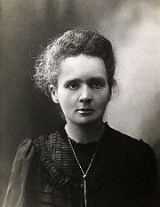
Marie Curie
Maria Skłodowska-Curie was a Polish-born scientist. The first woman to be awarded a Nobel Prize, in 1903, for Physics, she became the first person to win two with the 1911 Nobel Prize for Chemistry. She founded the Curie Institute.
Sourced
- One never notices what has been done; one can only see what remains to be done.
- Letter to her brother (1894)
- I have no dress except the one I wear every day. If you are going to be kind enough to give me one, please let it be practical and dark so that I can put it on afterwards to go to the laboratory.
- Instructions regarding a proposed gift of a wedding dress for her marriage to Pierre in July 1895, as quoted in 'Madame Curie : A Biography (1937) by Eve Curie Labouisse, as translated by Vincent Sheean, p. 137
- Be less curious about people and more curious about ideas.
- Response to a reporter seeking an interview during a vacation with her husband in Brittany, who mistaking her for a housekeeper, asked her if there was anything confidential she could recount, as quoted in Living Adventures in Science (1972), by Henry Thomas and Dana Lee Thomas
- Variant: In science, we must be interested in things, not in persons.
- This is stated to be a declaration she often made to reporters, in Madame Curie : A Biography (1937) by Eve Curie Labouisse, as translated by Vincent Sheean, p. 222
- We must not forget that when radium was discovered no one knew that it would prove useful in hospitals. The work was one of pure science. And this is a proof that scientific work must not be considered from the point of view of the direct usefulness of it. It must be done for itself, for the beauty of science, and then there is always the chance that a scientific discovery may become like the radium a benefit for humanity.
- Lecture at Vassar College, Poughkeepsie, New York (14 May 1921)
- All my life through, the new sights of Nature made me rejoice like a child.
- Pierre Curie (1923), as translated by Charlotte Kellogg and Vernon Lyman Kellogg, p. 162
- You cannot hope to build a better world without improving the individuals. To that end each of us must work for his own improvement, and at the same time share a general responsibility for all humanity, our particular duty being to aid those to whom we think we can be most useful.
- Pierre Curie (1923), as translated by Charlotte Kellogg and Vernon Lyman Kellogg, p. 168
- I believe international work is a heavy task, but that it is nevertheless indispensable to go through an apprenticeship in it, at the cost of many efforts and also of a real spirit of sacrifice: however imperfect it may be, the work of Geneva has a grandeur that deserves our support.
- Letter to Eve Curie (July 1929), as quoted in Madame Curie : A Biography (1937) by Eve Curie Labouisse, as translated by Vincent Sheean, p. 341
- I am among those who think that science has great beauty. A scientist in his laboratory is not only a technician: he is also a child placed before natural phenomena which impress him like a fairy tale. We should not allow it to be believed that all scientific progress can be reduced to mechanisms, machines, gearings, even though such machinery also has its beauty.
Neither do I believe that the spirit of adventure runs any risk of disappearing in our world. If I see anything vital around me, it is precisely that spirit of adventure, which seems indestructible and is akin to curiosity.- As quoted in Madame Curie : A Biography (1937) by Eve Curie Labouisse, as translated by Vincent Sheean, p. 341
- Variant translation: A scientist in his laboratory is not a mere technician: he is also a child confronting natural phenomena that impress him as though they were fairy tales.
- Nothing in life is to be feared, it is only to be understood. Now is the time to understand more, so that we may fear less.
- As quoted in Our Precarious Habitat (1973) by Melvin A. Benarde, p. v
- Humanity needs practical men, who get the most out of their work, and, without forgetting the general good, safeguard their own interests. But humanity also needs dreamers, for whom the disinterested development of an enterprise is so captivating that it becomes impossible for them to devote their care to their own material profit. Without doubt, these dreamers do not deserve wealth, because they do not desire it. Even so, a well-organized society should assure to such workers the efficient means of accomplishing their task, in a life freed from material care and freely consecrated to research.
- As quoted in Astrophysics of the Diffuse Universe (2003) by Michael A. Dopita and Ralph S. Sutherland
- I was taught that the way of progress was neither swift nor easy.
- Java Connector Architecture : Building Custom Connectors and Adapters (2002) by Atul Apte, p. 69
- There are sadistic scientists who hurry to hunt down errors instead of establishing the truth.
- As quoted in The Commodity Trader's Almanac 2007 (2006) by Scott W. Barrie and Jeffrey A. Hirsch, p. 43
- I am one of those who think like Nobel, that humanity will draw more good than evil from new discoveries.
- As quoted in White Coat Tales : Medicine's Heroes, Heritage and Misadventures (2007) by Robert B. Taylor, p. 141
